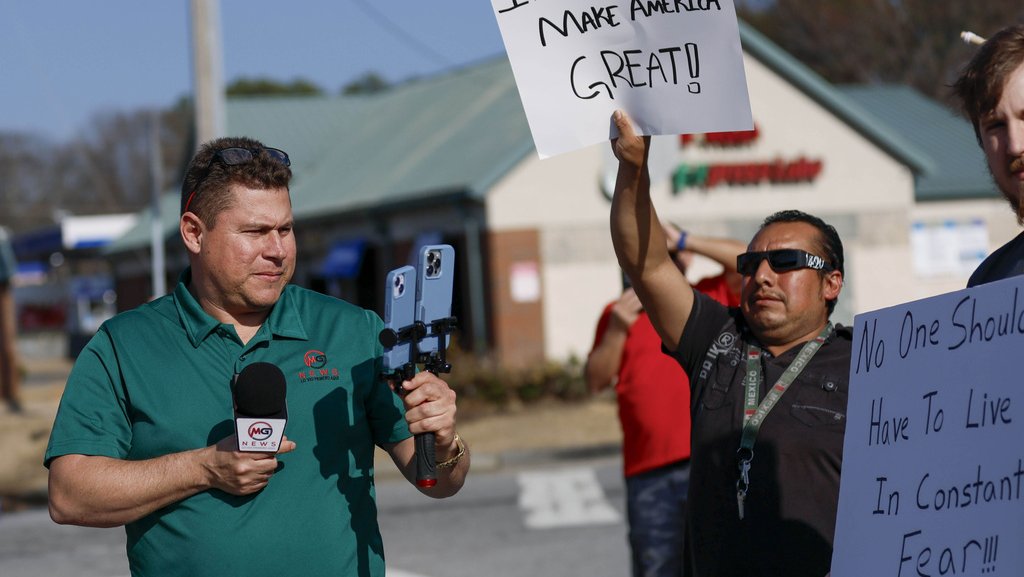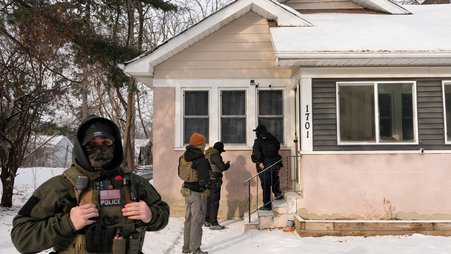When ABC suspended “Jimmy Kimmel Live!” last week following a shakedown from the Trump administration, celebrities, free speech advocates, and ordinary Americans voiced their outrage. They were right to sound the alarm — and it (mostly) worked. Kimmel’s back on the air.
But where is that same outrage against the government’s effort to deport Mario Guevara, an Atlanta-area journalist with a work visa who has lawfully resided in the U.S. for 20-plus years? His only “offense” is informing the public of protests against the government.
This week, a final removal order was issued against Guevara, who was arrested (with the baseless criminal charges since dropped) while livestreaming a July “No Kings” protest in Georgia. He might not have a late-night comedy show, but his right to report news is every bit as important as Kimmel’s right to tell jokes.
The stakes in Guevara’s case — both for him and for the country — are even higher than in the Kimmel fiasco that has dominated headlines. Guevara could be deported at any moment, likely to his birthplace, El Salvador, which he fled decades ago to escape political persecution.
Despite the extremely serious constitutional implications of Kimmel’s case, his worst-case scenario was moving from prime time to a podcast. There is no telling what fate might await Guevara if he’s thrown out of the country.
And if that happens, the chilling effect on journalists — particularly noncitizen ones, even those like Guevara with legal status — will be impossible to measure. After all, we only know what news we hear. We don’t know what news we don’t hear because journalists didn’t report it out of fear for their safety or freedom.
Kimmel‘s worst-case scenario was moving from prime time to a podcast. There is no telling what fate might await Guevara.
Kimmel’s professional peers — famous comedians and other celebrities — might feel relieved that Kimmel ultimately got his show back. But most journalists (or comedians, for that matter) aren’t famous and don’t have a Rolodex of Hollywood A-listers ready to come to their defense. Kimmel’s win offers them little comfort.
Independent journalists like Guevara also don’t have money for lawyers, lobbyists, or PR firms to make their case to judges, politicians, or the public (although fortunately, organizations like the ACLU, Free Press, the Committee to Protect Journalists, and others have stepped up).
Federal Communications Commission Chair Brendan Carr tried to manufacture plausible deniability in Kimmel’s case, arguing that it wasn’t his public ultimatum but pressure from local audiences that led ABC and its affiliates to pull Kimmel. That’s nonsense, but in Guevara’s case — much like the case against Rümeysa Öztürk, the Tufts University student facing removal for co-writing an op-ed critical of Israel — the government is hardly attempting to hide its agenda.
The federal government seeks to deport Guevara — despite his work visa and despite local prosecutors dropping their case against him for livestreaming in public — because, to them, his reporting makes him an “undesirable.” How did journalism, the only career protected by the Constitution, become a disfavored profession in America?
Guevara’s reporting often focused on immigration enforcement abuses. That earns him no friends in a government that considers U.S. Immigration and Customs Enforcement agents to be secret police. From seeking to punish social media users who identify ICE agents to investigating radio stations that report on ICE raids to threatening whistleblowers who undermine the official narrative, the administration has made every effort to intimidate those who speak the truth about its immigration policy.
The secrecy is by no means limited to ICE — while Kimmel’s show was in limbo and Guevara wrote letters from his cramped jail cell, the Pentagon announced it would force reporters to pledge to only report authorized information.
What this administration cannot seem to comprehend is that the First Amendment exists for the sole purpose of protecting the right to publish information the government does not want published. There would be no need for a constitutional right to publish what the government wants. Everyone loves free speech when the speaker is on their side.
Guevara is exactly who the constitution was intended to protect — and his retaliatory deportation is exactly the kind of authoritarian censorship it was intended to prevent.
Kimmel will be all right with or without ABC, and with or without you. That doesn’t mean not to protest efforts to censor him — the FCC’s antics are unconstitutional, un-American, and fully deserving of contempt. Carr should be fired and disbarred, and the corporations that caved to him should be ashamed.
But free speech is not only for celebrities. The real battles for our rights are not fought in television studios and theme parks but at protests and in citizen journalists’ home newsrooms. And these days, in detention centers and immigration courts.





